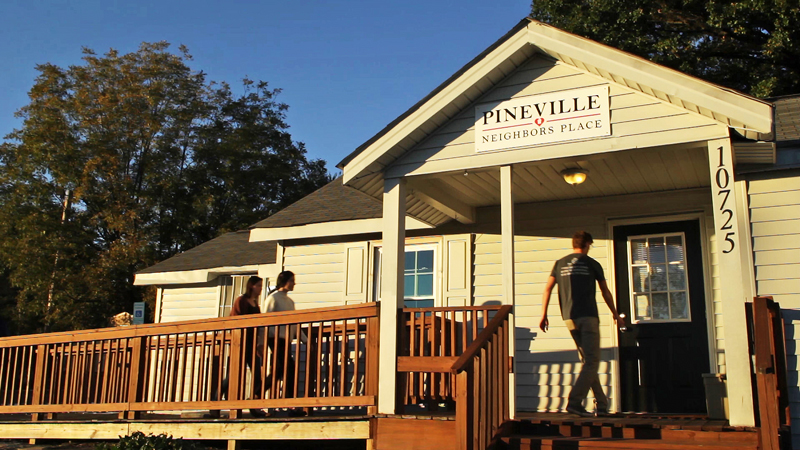Pineville is an example of a suburban city in which poverty often goes unseen. Digital tools can help create a solution.
There is no local access to community services for people who live in Pineville. They have to come to uptown Charlotte to get any financial help — and there are so many barriers to be doing that. First of all, if you don’t have transportation you have to ride about an hour on bus. If you’re going to Crisis Assistance Ministry, you have to take the day off from work, get in line at about 6 in the morning, stand in line with hundreds of other people, and you may or may not get seen. That’s hard. When our volunteer team met with Crisis Assistance staff, we realized they helped very few people out of Pineville. They said, “We know the poverty rate is high there, so why are we helping so few people?” It’s because there were so many barriers for people to be able to get that help.
The poverty rate in Pineville is about between 15 and 20 percent. Pineville Neighbors Place has pledged to have an office in Pineville and serve people affected by poverty and homelessness so they can get the help they need. We can connect them with the organizations that provide help.
One of the huge barriers to being able to access computers is that we don’t have a convenient library. Years ago, they decided to centralize our library system, which makes sense economically, but makes accessibility very hard. Pineville is in a corner of Mecklenburg County. Our closest library is South County Regional and it’s about six miles away — a 30-45 minute bus trip. If you’ve ever been to South County Regional, you know their computers are booked most of the time. So once you get there, being able to find time where you can actually get on a computer is very difficult. We realized early on that we needed to address that issue. We have a couple of laptops available for use at our office. People can come in and use them for tasks such as job applications, checking email and online benefits.
Digital literacy is very important because there are more and more resources that are online. First of all, most job applications are online — so to apply, one must understand how to navigate a website, click through to the next page, and do other basic internet skills. Knowing how to write a resume is also crucial in the job application process. Digital literacy allows people to be able to 1) write a resume and 2) attach it to an application. There are also food stamp applications online as well as health insurance information that is important to be able to access.
There remains a high population of people in Pineville living in apartments who work for minimum wage and are struggling. However, that is not what one would assume when driving through the town. When you drive through Pineville, you see a pretty downtown, a hospital, a mall, and you don’t notice the poverty. We don’t have what people might call an inner-city ghetto or what you might think of with extreme poverty, but we have people living right on the edge of being homeless.
Costs of housing have gone through the roof, making it difficult for anyone to find reasonably priced housing, regardless of income. We must address the issue with regards to public policy. We need reasonably priced housing that people can afford without having to work two or more jobs. Another issue we see regularly is families resorting to living in extended stay hotels because either they have an eviction on their record or they can’t save up enough for a deposit for an apartment. This is not a good environment for a family to raise children.
The way the eviction process works right now, in my opinion, is broken and leads to a cycle of poverty. Say your rent was due on the first and you’re late paying it. By the time you get to the 20th on the first month that you’re late, the landlord can file eviction papers that automatically adds legal costs to your rent. The family is trying to figure out how they’re going to pay that amount when, 10 days from then, they would need to pay for another month’s rent. It only takes about two weeks after that before the sheriff will padlock them and they’re out of their home. It’s a very quick process. You do get to go to court and state your case. But once again, you have to have transportation to go uptown and lose that day’s wage. That’s the challenge with living on the edge — once that cycle starts it’s really hard to get out of it.
It won’t be a quick or easy fix and there are many people who will fight against reasonably priced housing. They’ll say “not in my backyard.” These people stereotype those who need affordable housing. However, there isn’t a category of those who need affordable housing. The people that I meet span all races, ages, and educational backgrounds. They’re extremely diverse and the one thing they have in common is that they are struggling financially. Until we can get either laws passed or public officials that understand that we need to serve all the people, we’re going to keep fighting because we need to have housing for everybody regardless of their income or background. We need safe, comfortable housing for everybody.
Pineville Neighbors Place is a nonprofit that believes in neighbors helping neighbors. We want Pineville to be a community where all people are living satisfying and fulfilling lives with access to all of the services they need.
Jane Shutt is executive director of Pineville Neighbors Place.
